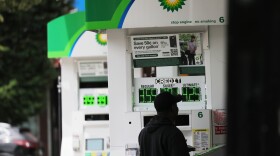
Scott Horsley
Scott Horsley is NPR's Chief Economics Correspondent. He reports on ups and downs in the national economy as well as fault lines between booming and busting communities.
Horsley spent a decade on the White House beat, covering both the Trump and Obama administrations. Before that, he was a San Diego-based business reporter for NPR, covering fast food, gasoline prices, and the California electricity crunch of 2000. He also reported from the Pentagon during the early phases of the wars in Iraq and Afghanistan.
Before joining NPR in 2001, Horsley worked for NPR Member stations in San Diego and Tampa, as well as commercial radio stations in Boston and Concord, New Hampshire. Horsley began his professional career as a production assistant for NPR's Morning Edition.
Horsley earned a bachelor's degree from Harvard University and an MBA from San Diego State University. He lives in Washington, D.C.
-
Fitch cut the federal government's top rating, citing rising deficits and a steady deterioration in governance over the last two decades. The action drew a sharp rebuke from the Biden administration.
-
Fitch Ratings cut the U.S.'s rating by one notch, moving it from the previous top-rated AAA to AA+, citing worsening governance as a key factor — just months after the country averted a debt default.
-
Consumers kept spending and businesses investing in the first half of the year, leading to healthy growth in the U.S. GDP. But there's still some apprehension about a possible recession. Here's why.
-
The Tour de France concludes just as another storied cycling event begins: the Des Moines Register's Annual Great Bicycle Ride Across Iowa. This is RAGBRAI's 50th year.
-
At the start of the year, economists were warning the U.S. was likely headed for a recession, but the U.S. economy has proven remarkably resilient. So what gives?
-
The federal government's budget gap widened significantly in the first nine months of the fiscal year, as tax receipts slumped and spending increased.
-
Annual inflation fell to 3% in June, the lowest since March 2021. That probably won't stop the Federal Reserve from raising rates again, but this month's expected hike could be the last.
-
Consumer inflation hit 3% in June, the lowest since March 2021. Though easing prices will be comforting to the Federal Reserve, inflation is still running higher than the central bank would like.
-
U.S. employers added 209,000 jobs in June. That's a solid number, but fewer than the month before. Here are the 5 things we took away from the report.
-
U.S. employers added 209,000 jobs in June, marking another respectable month of job growth, though it was slower than in previous months.








